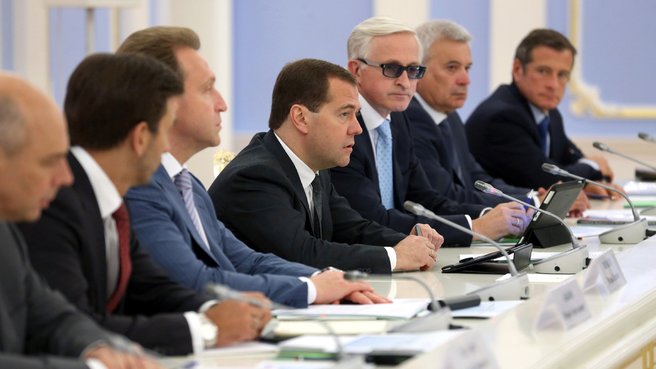Dmitry Medvedev: "This bill, which has been drafted to ensure the execution of the deoffshorisation policy, provides for amending the Tax Code with regard to controlled foreign corporations (CFCs). These are foreign companies in which part of the charter capital belongs to Russian companies or persons. The bill includes a taxation mechanism for them."
Dmitry Medvedev’s opening remarks:
Colleagues, we asked for a meeting with the RUIE Board and generally with members of the Russian business community for one rather pressing reason related to a draft law on so-called deoffshorisation. We all understand how sensitive this issue is. It is of fundamental importance for the economy to create a comfortable business environment, lay down clear and transparent working rules for business people, and increase the attractiveness of our jurisdiction. This is what the Government, the business community and public organisations should direct their efforts at.
Now, let me speak about the subject-matter of this draft law. Controlling the offshores, the special tax jurisdictions, and the activities of their residents is something practiced by the absolute majority of states. Laws of this kind – some stricter, others more lenient – are adopted by most different countries.
Dmitry Medvedev: "It is of fundamental importance for the economy to create a comfortable business environment, lay down clear and transparent working rules for business people, and increase the attractiveness of our jurisdiction. This is what the Government, the business community and public organisations should direct their efforts at."
I remember how it all began. This must have reached an active phase in 2009, when we discussed the matter at a G20 meeting. The French were the first to bring up the subject, followed by other Europeans and then the Americans. Later, the well-known statutory enactments were approved, aimed at controlling the taxation of foreign accounts. Next the OECD joined the effort actively, with a number of advanced economies approving certain specific laws. Let me emphasise this once again… These laws are different. There is no uniformity. It is for this reason that we have assembled here. We need to discuss this subject.
Dmitry Medvedev: "The common aim that I see here is to join hands and make the new tax rules not only transparent and clear for participants, but also implementable."
The common aim that I see here is to join hands and make the new tax rules not only transparent and clear for participants, but also implementable. No one is going to build castles in the air, this makes no sense. Moreover, the development level of economic relations and the legal system in this country has specific features of its own. This is why it is extremely important to make the wording clear, avoid the double, triple, etc., entendre, and try to take into account all of the positions that may be expressed. Mr Shokhin and I have discussed this subject. I know that the Ministry of Finance, which is responsible for drafting the bill, held a number of meetings. As I understand, they managed to coordinate a number of issues, but some are still unsolved, and this is why we have arranged this meeting today.
Dmitry Medvedev: "This bill, which has been drafted to ensure the execution of the deoffshorisation policy, provides for amending the Tax Code with regard to controlled foreign corporations (CFCs). These are foreign companies in which part of the charter capital belongs to Russian companies or persons. The bill includes a taxation mechanism for them.”
I probably won’t address that again specifically. The purpose of this draft law is clear: it provides for amending the Tax Code with regard to controlled foreign corporations (CFCs). These are foreign companies in which part of the charter capital belongs to Russian companies or persons. The bill includes a taxation mechanism for them. As with any mechanism, it is probably not ideal, and we should try to remove all potential problems as we are preparing it. We shouldn’t get ahead of ourselves, but we should keep with the trend that emerged at the beginning of the financial crisis, as I’ve said.
The document was made public for discussion with the business community back in March. It has been discussed by various expert circles, and you have taken part in those discussions as representatives of rather large businesses that use foreign companies, one way or another, to achieve your business goals.
I would like to stop here and ask Mr Shokhin to tell us what remains to be said on the subject of the bill.
<…>












